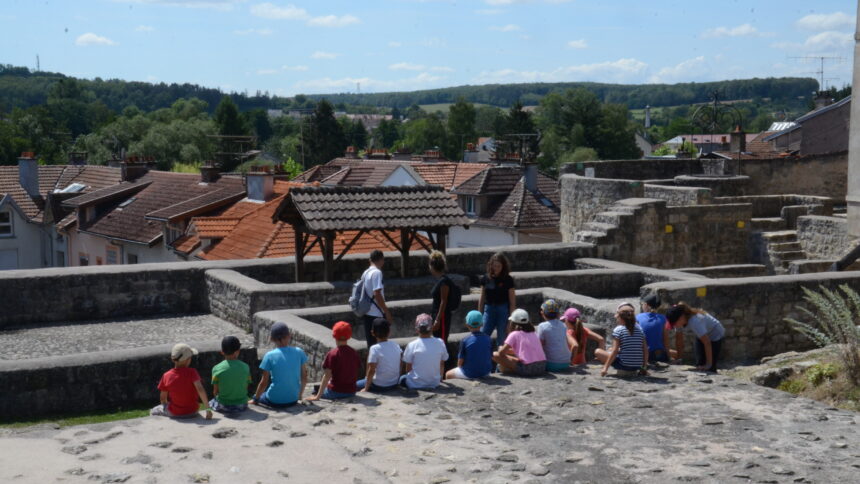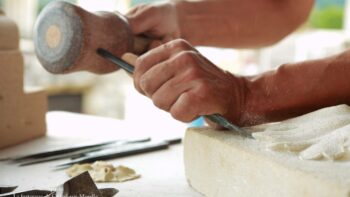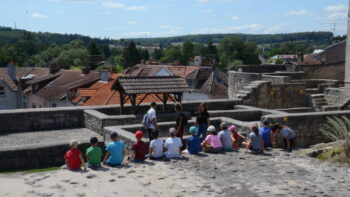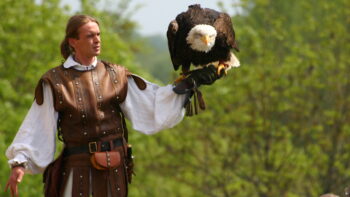Cultural and educational activities for schools and leisure centres
The Vieux Châtel association offers a wide range of cultural and educational activities all year round for schoolchildren of all levels and children in leisure centres:
The visit of the fortress
During the visit, which lasts about two hours, the children first discover the rooms of the museum which present models and important archaeological material (pottery, glass, leather, metal, wood).
The group is then guided to a drawbridge and a gatehouse tower, then along the keep and into the three floors of underground galleries. They visit the Arsenal and discover the double enclosure to the north and the spectacular moats. The visit ends at the shop. At the end of the visit, various workshops are offered, which are detailed below. If necessary, the group can be divided into two parts, one for the visit, the other for the workshops and vice versa.
All levels including preschools
Workshop list
Archaeology
Archaeology studies and reconstructs history from Antiquity to the present day and has made possible to rediscover a large part of the Middle Ages thanks to excavations and dating systems for discovered objects (pottery, clothing, bones, jewellery, etc).
This new workshop offers to the pupils the opportunity to become archaeologists for half a day with a small excavation reconstruction. Equipped with the tools of the archaeologist, they bring to light objects of medieval reconstruction: fake bones and pieces of pottery. The pottery puzzle is then assembled and glued together.
All levels
_____
Mosaic
Mosaics are a decorative art form that originated in Antiquity and flourished in the Middle Ages, especially in religious buildings.
Pupils discover its mysteries through a fun and creative workshop: they learn the technique of gluing and assembling the tesserae. They can make a miniature mosaic to take home.
All levels
_____
Pottery
The workshop is an approach to pottery techniques, starting with the colombin still in use today.
Pupils learn to work with clay by kneading and then shaping it into rods. The objects made are primarily inspired by those discovered on the site and exhibited in the museum: culinary potteries, small vases or seals. Other themes can also be offered, such as the creation of masks or animal subjects.
All levels
Notes: The potteries are simply dried and can be taken away immediately. However, it is possible to fire them in a traditional kiln for a supplement of €25 for the whole group.
_____
Calligraphy
Calligraphy allows the student to approach writing in a different and artistic way. It can also help them in their learning process to perfect their own style. Using a reed calamus, each student makes a parchment in Gothic script with his/her first name or a message to parents or friends.
Levels: Primary and Secondary schools
______
Illumination
Illumination aims to highlight the text, to make it more beautiful, and therefore to put it into images. Using plant or animal decorations, each pupil uses a canvas and the colours provided.
Levels: Year 4 – Secondary school
______
Heraldry
Coats of arms appeared as early as the Crusades. They allowed knights to be identified on the battlefield.
The workshop aims to explain to students the main rules that codified them, and then to put them into practice by creating a personal coat of arms. Students are free to use the traditional forms of heraldry or to use their own creativity and contemporary codes.
Levels: Year 4 – Secondary school
______
Basketry
The use of wicker fibre is very old. In the Middle Ages, people used the winnowing basket, a flat basket with raised edges that was shaken with force to separate the good grain from the straw. The lords of Neufchâtel had vast plantations in their possessions in Fayl Billot, located 20 km from Langres. The range of models prepared for the realisation (baskets, trinket bowls…) is planned according to the level of the pupils.
Levels: Year 4 – secondary school
______
Leather
This workshop offers individual work on a material widely used in the Middle Ages: leather.
The activity includes the production of a purse in three stages, inspired by those of the 15th century. The students will learn about tracing, cutting with appropriate templates and tools, and assembling in the traditional way.
Level: Year 5 and 6 – secondary school
_____
Theatre (coming soon)
This workshop offers students the opportunity to create theatre scenes. This work reinforces self-confidence and listening to others.
All levels
_____
The Garden
Students learn how to recognise plants using smell, vision and touch.
They take part in making a herbal tea and potting a shoot to take home.
Level: Nursery – Primary school
Rates for educational and cultural services
Simple visit: €4 / child
Visit + workshop €8 / child
Accompanying adults: €2.5 / adult (including teachers)
Warning:
For groups of less than 10 people the rates are different:
– Single visit at €5 per person (including
guides)
– Visit + workshop at €10 per person (including accompanying persons)
_____
Meals
During a day’s stay, on bad weather days, it is possible to have a picnic in a large room, heated if necessary. On sunny days, a large playground on the banks of the Moselle will welcome you.
______
Workshop levels
The level required to participate in the workshops is indicated after the description of the activity. However, it is possible to adapt the content of the workshops by contacting us in advance (1 month) or to set up a specific programme for kindergarten and year 2 classes.
_______
Long stays
Our Centre can accommodate classes or leisure centres for several days (accommodation possible). A wide range of activities can be offered or carried out on request. Please contact us 2 months before the desired dates.
Approvals:
Youth and sport, youth and popular education
For information and reservations:
reservation@vieux-chatel.fr
Telephone:
+33 (0)3 29 67 14 18
Transport assistance:
As Châtel is recognised as a regional site, financial aid can be requested from the regional Departmental Councils.



